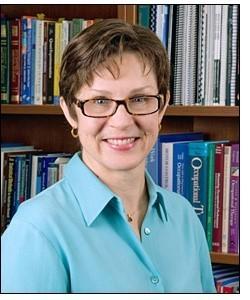Dr. Marcia Finlayson
Vice Dean (Health Sciences), Professor and Director

Dr. Finlayson started her career as an occupational therapist providing clinical services to people with a wide range of conditions and functional limitations.After several years of clinical practice, she returned to university to complete graduate work in community health, focusing on mobility-related factors that influence the ability of older adults to access health and social services in their communities.During this time, she also began volunteering for the MS Society and conducting research to support advocacy efforts.This volunteer work launched a research career linking her background in rehabilitation, her education in community health, and her interests in health and social services that support health and well-being in people with MS.For the past 20 years, these links have enabled Dr. Finlayson to focus her research on understanding patterns and predictors of service use among people with MS, and then using this knowledge to develop, implement and evaluate self-management programs that enable people with MS to exert choice and control over their daily lives.Her particular areas of expertise include fatigue management, falls prevention, and long-term care.Together with research collaborators around the world, Dr. Finlayson’s past research has shown that people with MS can effectively reduce the impact of fatigue on daily life by learning about and practicing fatigue management strategies through face-to-face and teleconference programs.Her work has also demonstrated that environmental and activity-related factors play an important role in falls among people with MS that must be addressed to effectively reduce falls.
Dr. Finlayson's currently funded research is testing a web-based fatigue management resource to determine whether providing people with MS with an interactive, self-guided tool for 3 months will reduce the impact of fatigue on their daily lives.
Learn more about Dr. Finalyson
How did you become interested in MS research? What inspires you to continue advancing research in this field?
My mother has MS and I have watched her try to access services that help her manage her symptoms. Many of the questions I have asked over time, and the studies I have conducted have been in direct response to the challenges I have watched her try to address.She continues to inspire my work every day.
What do you enjoy most about doing research and what are some of the challenges you face?
The most enjoyable parts of doing research are the intellectual stimulation of trying to solve a complex problem, working with other researchers who have different perspectives than me, and drawing in the next generation of researchers and preparing them to continue this work.
Describe the importance and level of collaboration in your research?
Collaboration is critical to my work.For example, my research on fatigue management involves collaborations with other occupational therapists in the US and Australia, and with researchers from nursing, physiotherapy, kinesiology, cognitive neuroscience, and neurology. All of these perspectives help to ensure that we are looking at the challenges of fatigue in different ways, which helps to push our knowledge further.
How important is the support from the MS Society in enabling you to conduct research?
Conducting a clinical trial on a fatigue management resource is a costly endeavour.We had to develop a complex website and recruit 200 people with MS from multiple locations.We will collect data from these individuals over the course of 9 months, and then analyze the efficacy and effectiveness of the website for reducing the impact of fatigue on the participants' every day lives.We need different people with different skills do to this work.Everything has a cost.Without funding from MS Society, we would be unable to do this work as other funders are often not interested in disease-specific programs.
If you could ask one question to a person living with MS that would help you design your study, what would it be?
How can we better find and connect with people with MS who are in rural and remote communities who may not attend a MS clinic and who are not connected to the MS Society?